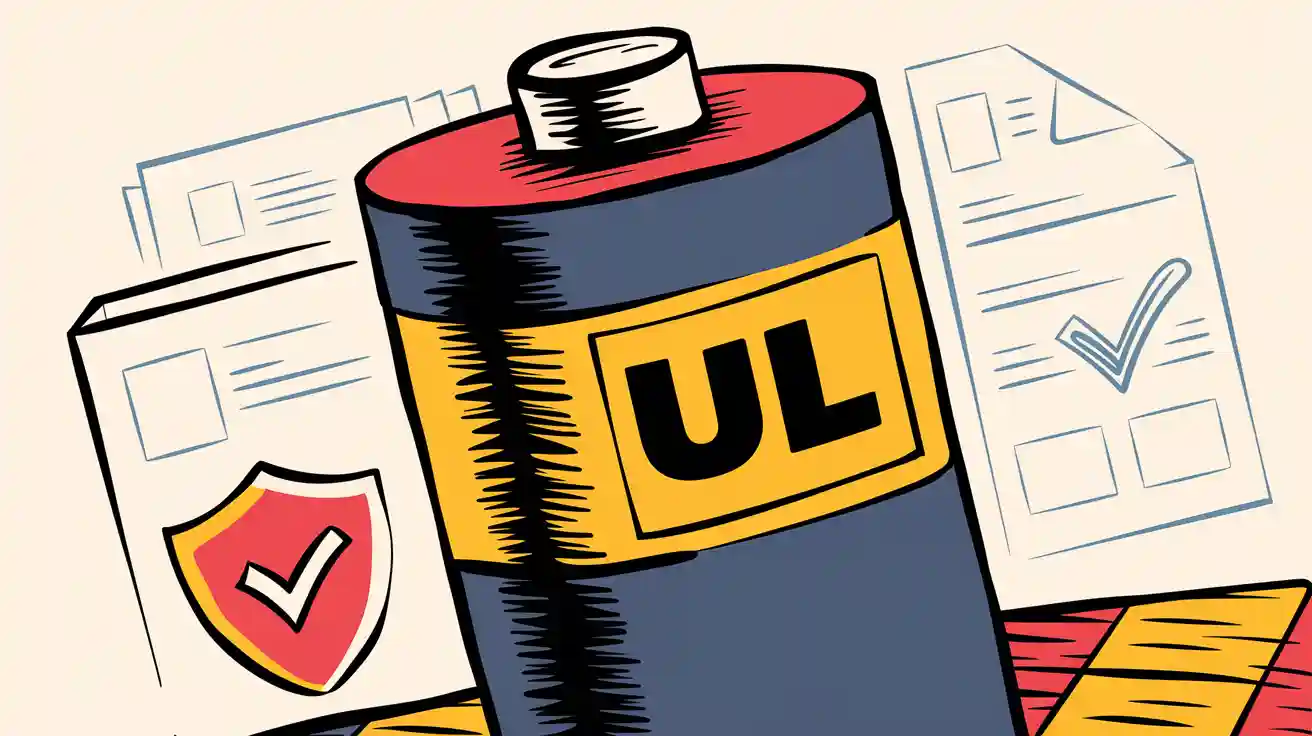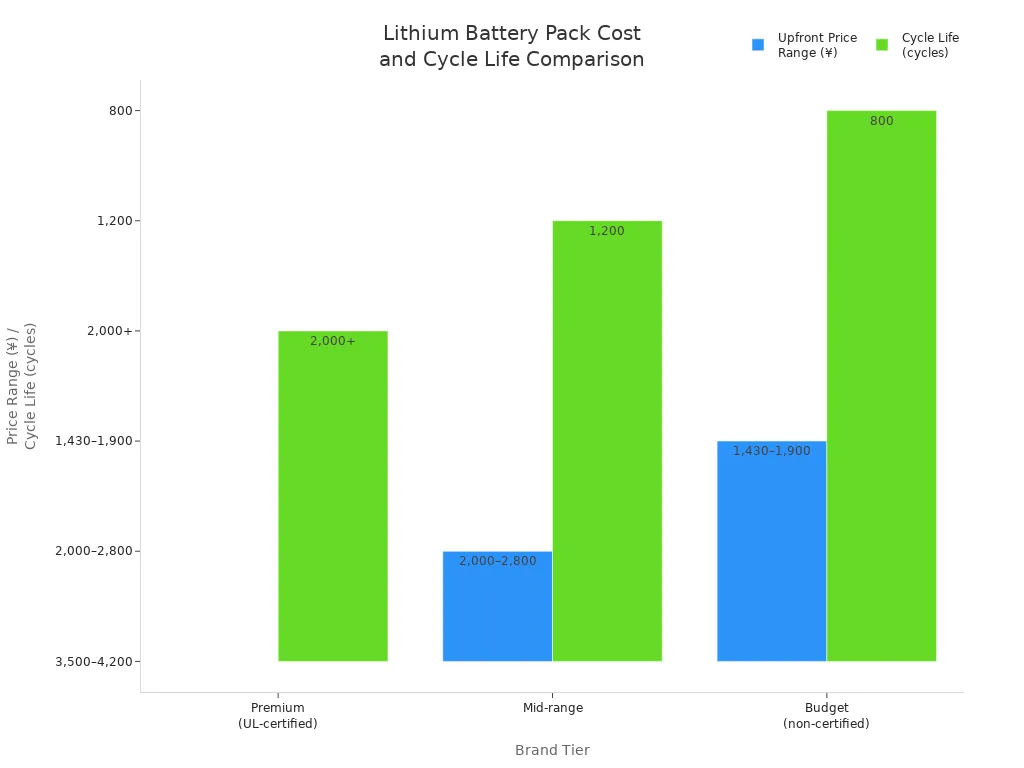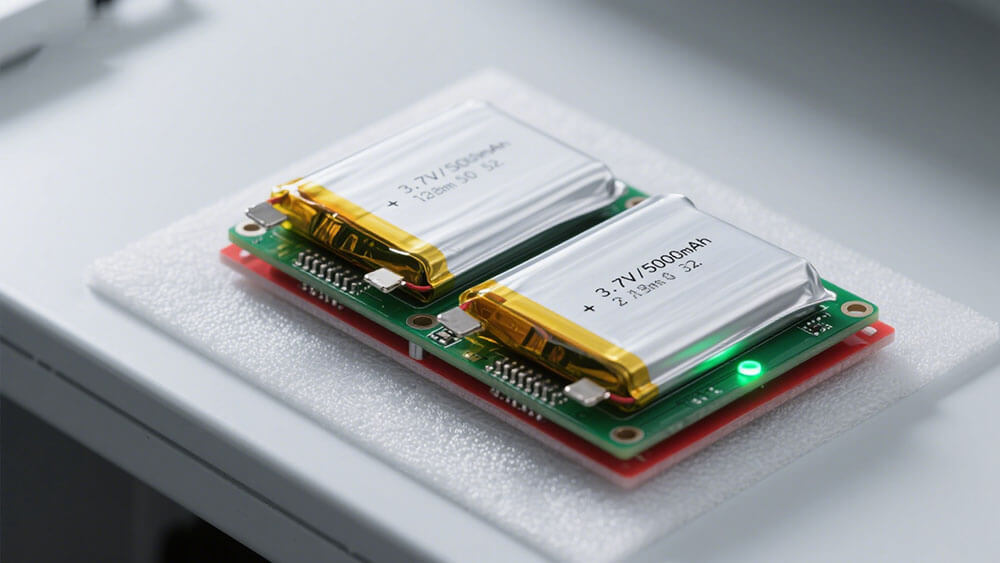
UL certification for lithium battery packs gives you reliable protection in demanding business environments. When you select lithium-ion batteries that meet UL safety standards, you address strict safety requirements and reduce risks of fire and explosions. UL evaluates every lithium-ion battery to ensure compliance, safety, and reliability. Choosing UL-certified batteries prevents costly liability and supports operational safety.
Key Takeaways
Choose UL-certified lithium batteries to ensure strong safety protections against fire, overheating, and physical damage in your business applications.
Using UL-certified batteries reduces risks of costly failures, legal issues, and recalls by meeting strict safety and reliability standards.
Verify UL certification carefully to build trust with clients, improve product reliability, and comply with industry regulations.
Part 1: UL Certification for Lithium Battery Packs

1.1 Safety
You face significant safety challenges when deploying lithium-ion batteries in business-critical applications. UL certification for lithium battery packs addresses these challenges by enforcing rigorous safety standards and comprehensive safety testing. UL evaluates batteries under abuse conditions such as overcharging, impact, short-circuiting, and overheating. These tests simulate real-world hazards, ensuring that each battery pack delivers high safety and reliability.
Note: UL certification includes tests like the Overcharge Test, Short Circuit Test, Crush Test, Drop Test, and Fire Exposure Test. These tests confirm that the battery management system (BMS) and integrated protection circuits activate as designed, preventing thermal runaway, fire, or explosion.
The most common safety hazards in business environments include:
Thermal runaway, which can cause uncontrollable heating, fires, and explosions.
Physical damage from dropping or impact, leading to internal failures.
Improper charging, such as overcharging or charging at incorrect rates, resulting in overheating.
Storing batteries in hot or humid environments, which increases risk.
Failing to inspect for damage, bulging, or leakage.
Lack of personnel training on safe handling practices.
Not using personal protective equipment (PPE) in industrial settings.
Manufacturing defects, such as poor welds or contamination, that compromise safety.
Non-compliance with safety standards, which increases the likelihood of incidents.
UL certification for lithium battery packs ensures that you meet strict safety requirements and minimize these risks. The certification process verifies that each battery includes robust safety mechanisms, such as thermal runaway protection, overcharge protection, and battery fire containment features. This approach delivers high safety and peace of mind for your operations.
1.2 Risks
When you use lithium-ion batteries without UL certification, you expose your business to severe risks. Non-certified batteries have a higher failure rate, limited safety margin, and less reliable thermal stability. These deficiencies increase the likelihood of fires, explosions, and toxic emissions. Real-world incidents, such as the widespread recall of non-certified hoverboards and laptops, highlight the dangers of skipping safety certifications.
Alert: The Consumer Product Safety Commission (CPSC) has issued multiple recalls for lithium-ion battery-powered products due to overheating and electrical shock hazards, often linked to non-compliance with UL safety standards.
The financial and legal consequences of using uncertified lithium battery packs can be devastating:
You may face significant fines and legal prosecution.
Your business reputation can suffer, leading to loss of consumer trust.
In extreme cases, authorities may revoke your operating license, resulting in business closure.
Product liability lawsuits can arise if a lithium-ion battery causes injury or property damage, with claims for medical expenses, lost wages, and pain and suffering.
The table below compares UL-certified and non-certified lithium battery packs:
Feature | UL-Certified Battery | Non-Certified Battery |
|---|---|---|
Failure Rate | Up to 70% fewer problems | Higher failure rate |
Safety Margin | High, exceeds thresholds | Lower, limited margin |
Thermal Stability | Stable under stress | Less stable |
Overcharge Protection | Robust, includes shutoff | Basic or lacking |
Reliability | Superior, fewer warranty claims | Variable, less reliable |

UL certification for lithium battery packs reduces fire risks and ensures compliance with evolving safety standards. Regulatory requirements, such as New York City’s Local Law 39, now mandate third-party certification for e-mobility devices, with early data showing fewer deaths and injuries after enforcement.
1.3 Trust
You build trust with your clients and partners by choosing UL-certified lithium-ion batteries. UL certification signals your commitment to safety, reliability, and compliance. B2B clients in sectors like medical, robotics, security systems, infrastructure, consumer electronics, and industrial applications demand high safety and proven performance.
UL certification involves third-party safety testing, ongoing inspections, and strict quality control. This process ensures that each battery meets or exceeds safety standards, reducing warranty claims and increasing customer satisfaction. Companies report up to a 60% reduction in warranty claims and 70% fewer fires with UL-certified batteries compared to non-certified alternatives.
Tip: Always verify UL certification by checking the UL database and requesting detailed certification information from your supplier. This step protects your business from fake certifications and ensures compliance with safety standards.
UL 2271 plays a key role in advancing safety standards for lithium-ion batteries, especially in light electric vehicles like e-bikes and e-scooters. This standard covers the entire battery system, including cells, wiring, casing, and management systems, and focuses on safety during charging, discharging, and collision scenarios. By prioritizing safety from the design phase, UL 2271 helps manufacturers deliver safer battery systems tailored to specific applications.
UL Standard | Application Focus | Contribution to Safety Standards |
|---|---|---|
UL 1642 | Lithium primary and rechargeable cells | Cell-level safety tests including flammability and impact resistance |
UL 2054 | Household and commercial batteries | Broad battery safety tests including electrical, mechanical, and fire safety |
UL 2271 | Batteries for light electric vehicles | Application-specific safety tests covering entire battery systems under operational and abuse conditions |
UL 2580 | Batteries for full-size electric vehicles | Safety tests for industrial and automotive battery packs under harsh conditions |
By choosing UL certification for lithium battery packs, you demonstrate a proactive approach to safety considerations and regulatory compliance. This commitment not only protects your business from fire risks and legal exposure but also strengthens your reputation as a trusted supplier in the global market.
Part 2: UL Certification Process

2.1 Testing
You need to understand the UL certification process to ensure the safety and reliability of your lithium-ion batteries. UL certification involves a series of steps designed to verify that each battery meets strict safety standards. The process includes:
Initial application and submission of your lithium-ion battery pack for evaluation.
Visual inspection for physical defects.
Battery performance testing under normal and extreme conditions.
Safety testing, including overcharge, short circuit, and thermal abuse tests.
Regulatory compliance testing to confirm adherence to safety standards.
Preparation and submission of technical documentation.
Analysis of test results by UL experts.
Issuance of the UL mark if all requirements are met.
Ongoing compliance monitoring through regular inspections.
UL certification for lithium-ion batteries typically takes 5 to 7 weeks for UL2054, covering inspection, safety testing, and certification issuance.
Certification Type | Typical Testing Time |
|---|---|
UL2054 | 5-7 weeks |
2.2 UL Marks
You will encounter several UL marks when sourcing lithium-ion battery packs. Each mark represents a different level of safety and compliance:
UL Mark Type | Description |
|---|---|
UL Listed | The complete lithium-ion battery product meets all safety standards. |
UL Recognized | Individual components, such as cells or modules, meet safety and performance criteria. |
UL Classified | The product is tested for specific attributes or limited risks under restricted conditions. |
UL Certified | Combines multiple UL certifications for global compliance and comprehensive safety indication. |
Displaying the correct UL mark on your battery packs signals your commitment to safety and compliance. Manufacturers benefit from these marks by gaining access to global markets and meeting requirements set by platforms like Amazon.
2.3 Identification
You must verify UL certification before purchasing lithium-ion batteries for your business. Reliable methods include:
Requesting UL test reports and certification documentation from your supplier.
Reviewing safety data sheets and packaging labels for the UL mark.
Conducting factory audits or engaging third-party inspection services.
Using digital platforms to check product traceability and real-time quality control data.
Tip: Always confirm that the UL mark is current and matches the specific lithium-ion battery pack you plan to use. This step protects your business from counterfeit products and ensures ongoing safety compliance.
You gain long-term safety and protection by choosing UL-certified lithium battery packs for your business. UL certification delivers continuous safety monitoring, robust safety features, and regulatory compliance. Insurance providers prefer UL-certified batteries due to their superior safety margin and reliability.
UL certification ensures:
Multiple safety protections
Ongoing safety audits
Reduced risk of fire and explosion
Compliance with industry safety standards
Aspect | UL-Certified Battery | Non-Certified Battery |
|---|---|---|
Safety Margin | High | Low |
Failure Rate | Low | High |
Thermal Stability | Strong | Weak |
You should always verify UL certification when sourcing lithium battery packs to maintain safety and peace of mind.
FAQ
1. What makes UL-certified lithium battery packs from Large Power suitable for medical and industrial use?
You get advanced safety features, stable platform voltage, and long cycle life.
Consult Large Power experts for custom solutions.
Chemistry | Platform Voltage | Energy Density (Wh/kg) | Cycle Life (cycles) |
|---|---|---|---|
LiFePO₄ | 3.2 V | 100-180 | 2000+ |
NMC | 3.7 V | 160-270 | 1000+ |
LCO | 3.6 V | 180-230 | 500+ |
2. How do you verify UL certification for lithium battery packs?
You check the UL mark on the product, review documentation, and confirm details in the UL database.
Tip: Always request certification proof from your supplier.
3. Why should B2B clients choose UL-certified lithium batteries for robotics and security systems?
You reduce fire risk, improve reliability, and meet regulatory standards.
UL-certified packs deliver consistent performance in demanding environments.




